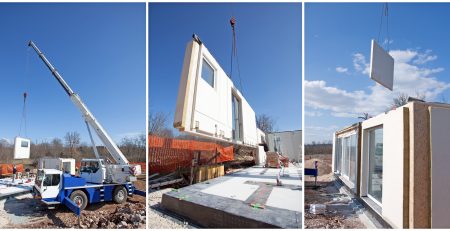Positive News as UK’s Construction Industry Enjoys Record-high Growth in April
Contrary to several ominous forecasts at the beginning of the year, and ahead of March’s Brexit plans, Britain’s construction industry fast-tracked to a 4-month high in April. This has confirmed speculative signs that the economy was poised for a little momentum, following its slow start to 2017.
April records strong month for construction
The Markit/CIPS UK Construction Purchasing Manager’s index (PMI) revealed a 0.9 unit rise from 52.2 in march to 53.1 last month. This is contrary to the forecasts of Reuters’ economists who predicted a slight drop.
The fastest growing sector was civil engineering, which set the pace in little over a year with its four-month high building project indices. The numbers reflect the results of a similar study posted few days ago that revealed construction factories in Britain had their best performance in 3 years, in April.
No doubt, this news should bring some form of respite to Theresa May as she prepares for a national election on June 8, 2017.
Last month, building companies took on additional employees to serve a growing increase in client demand.
Business experts from Euro Quality Coatings, who provide power coating solutions for aluminium and steel constructions in buildings. They are also leading the way in the use and supply of renewable energy products that are heavily used in the building industry by partnering with some top manufacturers.
They believe it’s a much-needed break for UK construction.
“The latest increase in demand should boost the confidence of many industry contractors who were bothered by the outcome of Brexit on their business. With this, more professionals can look forward to better deals ahead,” they say.
Optimistic outlook for tradesmen
Mr Sigurd isn’t the only person feel better about the future. A business poll organised by Simply Business showed that up to 76% of tradesmen are feeling optimistic about trade this year.
The last Markit survey also highlights a positive outlook with just 10% of respondents predicting a decline in construction output. However, up to 50% of respondents expect yield to increase.
The Director of Customer Relationships at the Chartered Institute of Procurement & Supply, Duncan Brooks had this to say, “With the biggest increase in new demands since the start of 2017, the construction sector is in a comfortable pre-election position sustained by a resilient UK economy and positive client attitude.”
Still more work ahead
It’s not all sunshine and roses yet, as Duncan Brook cautioned the construction industry. He maintains that shortage of skills in the construction industry is still a problem.
According to Mr. Brooks, it is a problem that should be tackled if the future of the industry must be guaranteed. He also mentioned rising cost of commodity, labour costs and reduced supply of essential materials, as issues that could affect future growth of the construction industry.
The effect of Brexit on the nation’s economy is still a cause of concern for many construction specialists as they advise professionals not to be blindsided by the present situation of things.
No doubt, the outcome of Brexit negotiations will have its own role to play in the sector considering its dependence on migrant labour and overseas raw materials. But if anything, break from decline is something experts can hope to capitalise on.
Solutions for the future
Nevertheless, the legislative and financial sectors are not resting on their laurels. The country’s overall economic condition being closely monitored.
Official reports released last week showed that the nation’s economy slackened early January and March this year as consumers were hit by inflation.
Next week, officials at the Bank of England will meet to discuss new interest rates, as some lawmakers express concerns about risk of inflation taking a more worrying turn.
The construction industry may have a long road ahead, but small victories on the way are guaranteed to instil confidence in investors and tradesmen. What other future lies ahead; do you reckon the growth will sustain itself?












